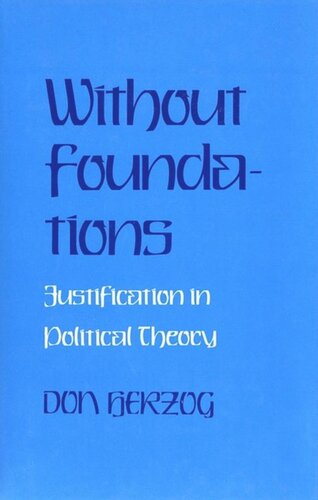

Most ebook files are in PDF format, so you can easily read them using various software such as Foxit Reader or directly on the Google Chrome browser.
Some ebook files are released by publishers in other formats such as .awz, .mobi, .epub, .fb2, etc. You may need to install specific software to read these formats on mobile/PC, such as Calibre.
Please read the tutorial at this link: https://ebookbell.com/faq
We offer FREE conversion to the popular formats you request; however, this may take some time. Therefore, right after payment, please email us, and we will try to provide the service as quickly as possible.
For some exceptional file formats or broken links (if any), please refrain from opening any disputes. Instead, email us first, and we will try to assist within a maximum of 6 hours.
EbookBell Team

4.1
50 reviewsCan political theorists justify their ideas? Do sound political theories need foundations? What constitutes a well-justified argument in political discourse? Don Herzog attempts to answer these questions by investigating the ways in which major theorists in the Anglo-American political tradition have justified their views. Making use of a wide range of primary texts, Herzog examines the work of such important theorists as Thomas Hobbes, John Locke, the utilitarians (Jeremy Bentham, J. S. Mill. Henry Sidgwick, J. C. Harsanyi, R. M. Hare, and R. B. Brandt), David Hume, and Adam Smith. Herzog argues that Hobbes, Locke, and the utilitarians fail to justify their theories because they try to ground the volatile world of politics in immutable aspects of human nature, language, theology, or rationality. Herzog concludes that the works of Adam Smith and David Hume offer illuminating examples of successful justifications. Basing their political conclusions on social contexts, not on abstract principles, Hume and Smith develop creative solutions to given problems.